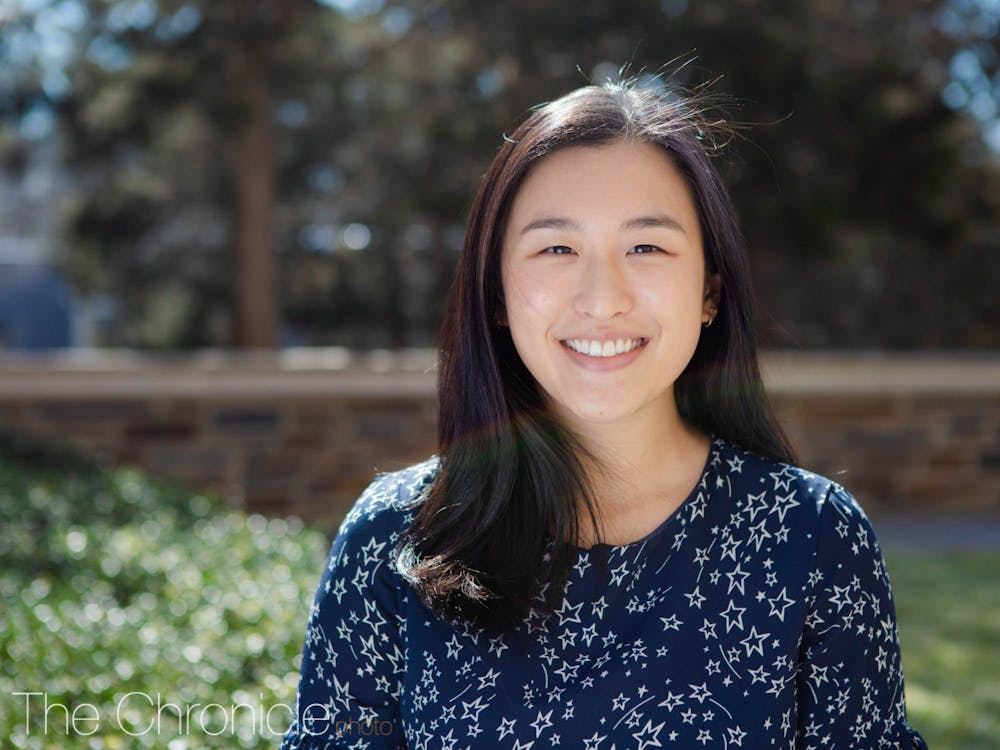When the pandemic forced Duke to transition online last March, junior Christina Wang decided that, as a way to cope, she would try and keep herself busy.
Then the newly elected Duke Student Government vice president of equity and outreach, Wang spent up to 10 hours a day working on DSG over the summer. Though DSG wasn’t in session, she helped create the Blue Devil Buddies mentorship program, call for a S/U grading policy and found the Student Advocate’s Office.
“I really was just giving my all at that time to DSG, and that illuminated for me the potential that DSG has,” she said. “I saw DSG taking a step forward and being proactive to help address students’ needs.”
After the summer, Wang realized that she wanted to be the one to lead DSG in reaching its potential. But there were still moments of doubt during first semester, and she wondered if someone else would be better for the role.
She finally came to a decision over winter break, when her friends sat her down and urged her to run for DSG president.
“They were like, ‘You really care so much about this. And you’re in a position where you’ve done the work, you’ve built the connections, you have the experience and a good understanding of what DSG is now, but also a vision of what you hope for it to become,’” she said. “And I think that latter part is what’s most important to me.”
Almost exactly a year after Duke shifted to remote learning, Wang was taking a nap when she received a call from senior Jason Scharff, DSG attorney general. She had been elected the 2020-21 DSG president, beating junior Carlos Diaz, with 52.2% of the votes.
“My roommate had just gotten a job offer at the exact same moment,” Wang said. “So she burst into my room and she was like, ‘I got the job!’ And I was like, ‘I won the election!’”
The path to presidency
On one of her first days as a Blue Devil, Wang decided that she wanted to be part of DSG. She was sitting in a packed Cameron Indoor Stadium during convocation, a few rows from the stage where Kristina Smith, Trinity ’19 and DSG president at the time, was giving a speech.
“I just remember being so awestruck, so inspired, hearing her and seeing her speak about how passionate she was about making Duke a better place,” Wang said.
Wang asked Smith to have lunch with her. During the lunch, Wang recalled that Smith encouraged her to run for senator for the equity and outreach committee.
But Smith, who has witnessed Wang’s “advocacy for equity and justice grow tremendously since her first year,” pointed out in an email that “as soon as she stepped foot onto campus and into DSG, she wanted to be on the equity and outreach committee.”
“She encouraged me to do all the things that I wanted to do, to go out there and not be afraid to try to create change, even if I was a newcomer to it,” Wang said.
Part of Wang’s hesitancy to run for president had to do with the anxiety of putting herself in the spotlight and opening herself up to criticism. She’s forthcoming about her fear of attention, “which maybe people wouldn’t think is the case, given that I ran for president,” she said.
But Wang also worried about how much work it would take to run a campaign, and she didn’t want to burden her close friends.
“It’s frankly so embarrassing for me to reach out to people and ask them for their help,” she said. “And I never want to ask more of people, of their time or labor, than I need to.”
When Wang formally decided to run, people pointed her to sophomore Finn Brauer and junior Amanda Kang, both of whom had experience working on political campaigns outside of Duke. Both instantly agreed to join as her campaign managers, even though they weren’t particularly close with Wang nor familiar with the inner workings of DSG.
“That’s something that she was conscious of,” Kang said. “She was really good about bringing a diversity of people’s engagements, concerns and experiences to her campaign.”
As part of her campaign, Wang met with cultural and identity student groups on campus to hear about their work and priorities. Brauer recalled that when Wang told her campaign staff that she wanted to meet with Mi Gente, Duke’s umbrella undergraduate Latinx student organization—which is led by her opponent, Diaz—someone pointed out that they were unlikely to endorse her.
“Christina was basically like, ‘I really don’t care, it’s important to me. Meeting with these groups isn’t about an endorsement. It isn’t about campaign clout. This is something I want to do,’” said Brauer.
When polls opened, Wang went onto the BC Plaza and began speaking with students, asking them if they had voted yet and if not, pitching her platform. With first-years, for example, she would talk about the Blue Devil Buddies program. With female students who said that they were interested in uplifting women at Duke, Wang would tell them about the work she had done to prevent gender violence, Kang explained.
“I know she was a little nervous, just because it was the day of the election,” Kang said. “But you could tell how easily she was able to connect with people on the different things that they cared about.”
The next day, when Wang found out that she had won, she texted a crying emoji into the campaign manager group chat.
“I panicked. I was freaked out,” said Brauer, who was in the middle of a run when he received the text. “I was like, ‘This is horrible, I’m on a run, I’m all sweaty, this is bad.’”
Her next text let them know she had won.
“This year has been a lot. And I think gut decisions are valuable, but in a year like this, everything that we’re going to be doing is going to be new,” Brauer said. “There’s a lot of people on campus who have had different experiences than other people. I think that reconciling that will take a really thoughtful leader, and Christina will take that in stride.”
Leading with empathy
Wang’s presidency next year will be defined by the relationships she cultivates with DSG members, student groups, administrators and the student body at large.
“I know this is a Joe Biden quote, but change does move at the speed of relationships,” she said.
Her goals, which include a restructuring of DSG’s project model, focus on uplifting the ongoing work and priorities of cultural and identity student groups.
“I don’t want senators coming in being like, ‘Oh, I want to do this,’ or ‘This is my idea,’” she said. “It’s not about you. If you’re joining DSG, you’re doing it as an act of public service.”
Wang acknowledged DSG’s history of shortcomings, especially towards marginalized groups. She understands that it may be difficult for student groups to trust DSG “as a mechanism of support for their activism.” She recognizes that building trust takes time, but she hopes that welcoming criticism and collaboration, and fostering these connections now will translate into sustainable, long-term relationships between organizations.
“She believes in what the Duke experience could be and isn’t afraid to be critical of what it is,” Smith wrote. “While I don't know if there is a way to be fully prepared for this role—for the ways that you must offer your opinions, ideas, agreements, and disagreements in rooms full of powerful people—I believe with the utmost confidence that Christina will rise to the occasion.”
Smith also highlighted the importance of the president being “rooted in the community,” she wrote, describing Wang.
“Sometimes, you’re the only student in the room, the only student whose opinion administrators are going to ask for, so it’s your responsibility to be in tune with what students need,” Smith wrote. “It’s a powerful role, and I don’t know if the profile pictures and endorsement contests make that power quite clear.”
Wang also plans to expand DSG’s transparency and accessibility with the student body through increasing meetings with student groups and sending members into first-year spaces to gauge new students’ knowledge of DSG.
Wang said that she agreed with a lot of points on Diaz’ platform, which included rectifying structural and accountability issues within DSG. But she doesn’t see her experience in DSG as a hindrance to creating real change.
“I’m not afraid to hold administrators accountable despite having worked with them before,” Wang added. “I think it’s a strength that I’ve worked with them before, because I can be upfront and be like, ‘Look, you know me, and you know that I’m serious about this.’”
Despite the responsibilities of the role, Wang’s guiding principle is simple: she hopes to lead with empathy.
“I really strive to listen to others. That’s my main priority in life. Always,” she said. “It’s always people first.”
Get The Chronicle straight to your inbox
Signup for our weekly newsletter. Cancel at any time.

Milla Surjadi is a Trinity junior and a diversity, equity and inclusion coordinator of The Chronicle's 119th volume. She was previously editor-in-chief for Volume 118.

